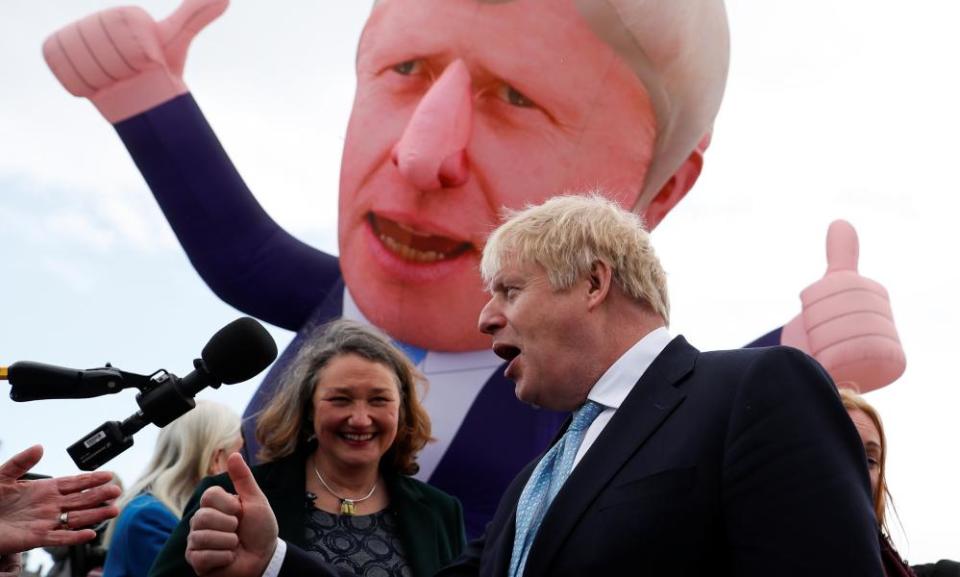The Tory formula for winning in north-east England: jabs, jobs, hope

Jill Mortimer, the brand new Tory MP for Hartlepool, explaining her historic byelection victory on Friday morning, said the town’s voters knew “Labour MPs had not been doing their best for them”.
But as the soul-searching began in Keir Starmer’s party, Labour strategists are not just asking themselves what Labour has done to neglect its former heartlands, but what Boris Johnson’s Conservatives have done right.
There are many factors, but one is clearly the prime minister himself. A Labour MP who has spent a lot of time canvassing voters in Hartlepool over the past few weeks said: “They like Johnson as a person. They see him as being optimistic.”
When the prime minister visited recently, he talked of the “massive opportunities” for the local area, and posed for selfies with schoolchildren.
A senior Conservative who has worked on campaigns with the prime minister said: “Boris is a good salesman. I don’t think anyone can doubt he’s an incredible campaigner, probably unrivalled in British politics.”
While Starmer has been harrying Johnson in Westminster over the questions about funding for his flat refurbishment, which has prompted several official inquiries, perceptions of “sleaze” do not yet appear to have dented his appeal.
Another Labour insider points out that, while Brexit may no longer be the first issue on voters’ minds in doorstep conversations, Johnson did what he had pledged, and pressed ahead with leaving the European Union in the face of furious opposition from many in Westminster (not least Starmer himself).
That has helped the Tories to present the prime minister as an insurgent figure, offering a fresh start, despite the party having been in power for more than a decade.
And the vaccine rollout – faster in the UK than in the EU, at least initially – may for some voters have vindicated the decision to back Johnson to “get Brexit done”.
Johnson’s former chief of staff Dominic Cummings argued on Twitter on Friday that the Tories had also continued to be aided by the dramatic political realignment brought about by the Vote Leave campaign – in the face of scepticism from commentators.
“When pundits who ‘explained’ why Vote Leave’s plan to realign politics was mad/stupid/impossible now give post hoc ‘explanations’ for why it’s all so logical/inevitable … ignore their babble … Pundits = noise not signal,” Cummings tweeted.
Another senior Vote Leave figure explained that the 2016 campaign married a leftwing pro-public spending message – memorably calling for an extra £350m a week to be spent on the NHS – with rightwing positions on other issues.
“That campaign managed to push forward the more traditional issues of crime and immigration, where a lot of the country are rightwing, and public services, where a lot of the country are leftwing and want more investment. So that big realignment was there, and Boris took that on: and that is what Boris has moved forward with as an agenda.”
Even before the pandemic, the government’s plans for significant investment in infrastructure, focused heavily on the areas where it hopes to hold on to its electoral gains, made it difficult for Labour to caricature Johnson as pro-austerity – despite continuing deep cuts in some areas, such as local authority funding.
And since Covid-19 struck, the chancellor’s unprecedented furlough scheme has meant a Conservative government directly paying the wages of millions of workers using taxpayers’ money – hardly Thatcherite laissez-faire.
The former Labour adviser James Meadway has called the Johnson government’s approach “Houchenism”, after the Conservative Ben Houchen, who unexpectedly won the Teesside mayoralty in 2017 and has consolidated the party’s hold in the region with promises of jobs and investment.
One seasoned Labour campaigner lamented: “Build a new corner-shop on Teesside and Houchen turns up in hi-vis and a safety helmet and claims the credit.” Another, who has been pounding the streets of Hartlepool, said: “Voters want a bit of that largesse.”
Promising a new freeport in Teesside, as well as a Treasury outpost in Darlington, has helped add to the sense that the government is optimistic about the economic future of the north-east of England – as well as its own capacity to hold on to the electoral gains it made in the region in 2019.
Houchen set out his approach in a recent piece for the ConservativeHome website, combining calls for more investment in green technologies with a culture war dig against climate protesters.
Related: ‘Obsessed with the flag’: Labour recriminations begin in Hartlepool
“Many of the people I represent have little time for the hug-a-husky politics of the pre-Johnson era, or the increasingly bizarre publicity stunts of extremists like Extinction Rebellion,” he said.
“They’re just as into clean air and against pollution as anyone, but the real draw of a Green Industrial Revolution is that it will mean more good jobs, both skilled and professional. Good jobs close to home too, not roles necessitating long commutes and weeks on end away from family.”
Even Johnson’s warmest supporters point out that if they want to win the next general election, the Tories will need to deliver on these promises of better infrastructure and more jobs, allowing voters to realise the “massive opportunities” Johnson is pointing to.
And the recent appointment of the MP Neil O’Brien to run the government’s “levelling up” programme underlined the fact there is not yet a full-blown policy behind the slogan. The economic backdrop may also become much more challenging, as the furlough scheme is wound up and unemployment rises.
But for the moment, at least in Hartlepool, voters seem inclined to back Johnson to finish what he started five years ago, when he defied David Cameron and threw in his lot with the mavericks of Vote Leave.

 Yahoo Finance
Yahoo Finance